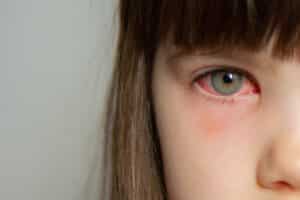
Pink eye, or conjunctivitis, is an infection or inflammation of the transparent membrane covering the white part of the eye and lining the eyelid. It can be caused by bacteria, viruses, or allergies. Symptoms include redness, itching, swelling, watery discharge, and sensitivity to light. Pink eye is highly contagious, often spreading through personal items or respiratory droplets. Prevention involves good hygiene practices like frequent handwashing and avoiding sharing personal items. Treatment depends on the cause, with antibiotics for bacterial cases, antiviral drugs for viral infections, and managing allergies for allergic conjunctivitis. Prompt medical attention is advised to prevent complications.
Causes of Pink Eye
Pink eye, also known as conjunctivitis, can be caused by various factors. Viral conjunctivitis is often the result of common viruses, such as those associated with the common cold. Bacterial conjunctivitis can be caused by bacteria like Streptococcus pneumoniae or Staphylococcus aureus. Allergic conjunctivitis is triggered by allergens like pollen, dust, or pet dander. Additionally, irritants such as smoke, chlorine in swimming pools, or foreign bodies in the eye can also lead to inflammation and pink eye.
Symptoms of Pink Eye
The symptoms of pink eye can vary depending on the underlying cause. Common symptoms include redness in the white part of the eye and inner eyelids, itching or burning sensation, increased tear production, swollen eyelids, blurred vision, and sensitivity to light. In viral and bacterial conjunctivitis, there may be a discharge from the eye, which can be watery or thick and yellowish. Allergic conjunctivitis may involve intense itching and tearing, along with other allergy symptoms like sneezing or a runny nose.
Treatment for Pink Eye
The treatment for pink eye depends on its cause. Viral conjunctivitis typically resolves on its own within a week or two without specific treatment. Antibiotic eye drops or ointments are often prescribed for bacterial conjunctivitis to help clear the infection more quickly. Allergic conjunctivitis may be managed with antihistamine eye drops or oral medications to alleviate symptoms and reduce inflammation. In addition to medication, warm compresses applied to the eyes can help relieve discomfort and remove crusting. It's important to avoid rubbing the eyes, which can worsen symptoms and spread the infection. If symptoms persist or worsen, it's essential to consult a healthcare professional for further evaluation and treatment.
FAQs
What is pink eye?
Pink eye, also known as conjunctivitis, is an inflammation or infection of the conjunctiva, the thin, transparent membrane covering the white part of the eye and lining the inner surface of the eyelids.
What causes pink eye?
Pink eye can be caused by viruses, bacteria, or allergies. Viral and bacterial conjunctivitis are highly contagious, while allergic conjunctivitis is triggered by allergens like pollen or dust.
What are the symptoms of pink eye?
Symptoms include redness, itching, tearing, swelling, a gritty feeling in the eye, discharge (which can be watery or sticky), and sensitivity to light.
How is pink eye spread?
Pink eye can spread through respiratory droplets from coughing or sneezing, direct contact with infected individuals, or touching contaminated surfaces or personal items.
How can I prevent pink eye?
Practice good hygiene, such as washing hands frequently, avoiding touching your eyes with dirty hands, not sharing personal items like towels or makeup, and avoiding close contact with people who have pink eye.
Is pink eye treatable?
Treatment depends on the cause. Bacterial conjunctivitis may require antibiotic eye drops or ointment, while viral conjunctivitis often resolves on its own. Allergic conjunctivitis can be managed by avoiding allergens and using antihistamine eye drops.
When should I see a doctor?
Consult a healthcare professional if you experience severe eye pain, vision problems, sensitivity to light, or if symptoms persist or worsen despite home treatment.
Can I go to school or work with pink eye?
It's advisable to stay home until symptoms improve and to consult a doctor for guidance on when it's safe to return to school or work to prevent spreading the infection.



